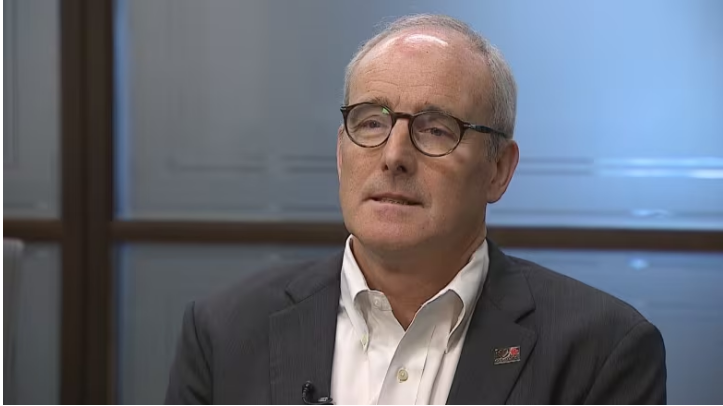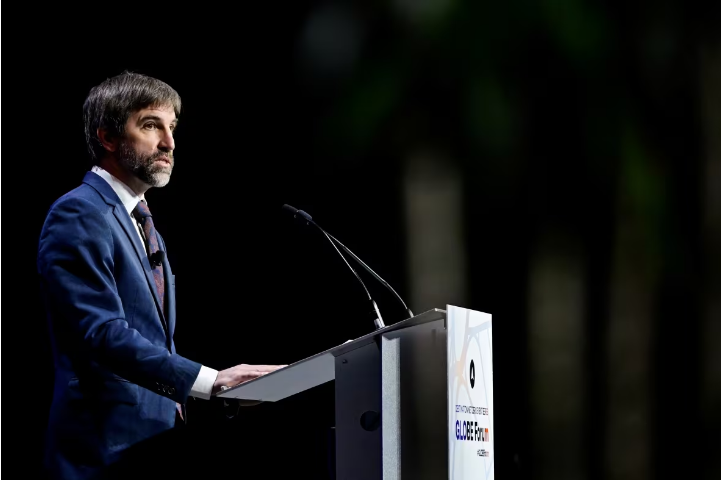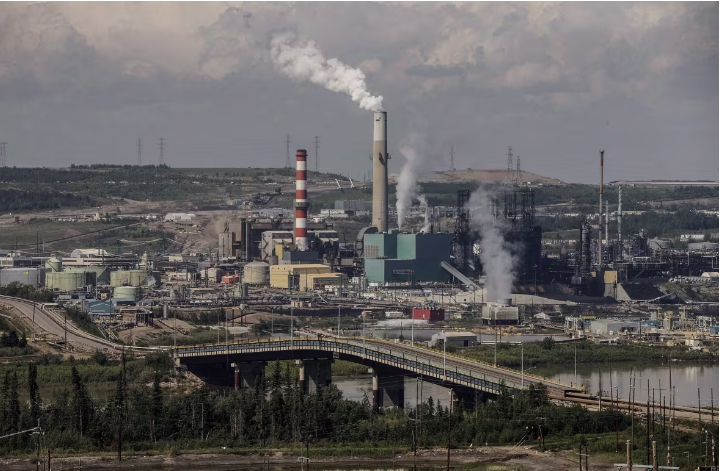
Derek Evans, the head of Calgary-based MEG Energy, told CBC Radio’s The House the lack of concrete details on climate policies are interfering with the chronology for decarbonization. (CBC)
An oil company CEO says federal and provincial governments are stuck on “academic discussions” about greenhouse gas emissions targets, putting timelines for their own goals in jeopardy.
Derek Evans, the head of Calgary-based MEG Energy, told CBC Radio’s The House the lack of concrete details on climate policies are interfering with the chronology for decarbonization.
“The whole 2030 timeline, what we said we thought we could do by 2030, that starts to get risked,” he said, adding the dialogue has been productive but lacking action.
Ottawa is crafting policies that would put legislative pressure on the sector to decarbonize more quickly, including an impending emissions cap and killing “inefficient” fossil fuel subsidies. An announcement on the latter is expected next week, but specifics have been scarce for years.
Canada has committed to net-zero by 2050, with an interim goal that would require oil and gas to cut 42 per cent of its greenhouse gas emissions below 2019 levels by 2030.

Canada’s Minister of the Environment and Climate Change Steven Guilbeault photographed speaking in Vancouver in 2022. Ottawa is crafting policies that would put legislative pressure on the oil and gas sector to decarbonize more quickly. (REUTERS/Jennifer Gauthier)
Both levels of government are feuding over 2030 targets, though they agree on the end date of 2050. Both are providing support to industry in the form of funding and tax credits, but disagree on the methods to reach a carbon-neutral economy.
“We will lose not only the opportunity to decarbonize, we are going to lose the next generation in terms of their belief in are we actually doing what’s right for the environment,” Evans said.
His daughter often presses him about his work, he said, and whether oil companies are serious when it comes to climate change.
Industry titans, including MEG’s partners in the Pathways Alliance that represents 95 per cent of oilsands production, have told the federal government getting to the 42-per-cent reduction goal is unrealistic by the end of the decade (In fact, they say it would take an extra five years to get there at the current pace).
The oilsands produce about 70 million tonnes of emissions annually, according to the Alberta government — about 11 per cent of Canada’s total pollution output.
“At some point, if you are serious about decarbonizing the oilsands for a variety of reasons, we need to see some progress towards that,” said Andrew Leach, a professor and energy and environment economist at the University of Alberta.
“But I think also … if the government is not going to recognize, for example, enhanced oil recovery as a means of carbon capture and sequestration, industry needs to know that before they can decide where to put their money.”
The federal government has announced billions in clean energy incentives and tax credits for things like carbon capture and storage. That’s what the industry wants clarity on. Alberta has also committed about $2 billion into carbon capture, utilization and storage (CCUS) and approved 25 proposals for carbon storage hubs.
CCUS technology traps and stores pollution from production underground. Despite political and industry buzz, it hasn’t been proven at a massive scale yet and remains relatively expensive.
Canadian oil and gas companies are hoping to lead the world in its development, but that’s becoming a steep task as U.S. measures like the Inflation Reduction Act provide historical investments for green tech.
Canada has been floating decarbonization and carbon capture for 30 years (early mentions appear in a 1994 report on climate to the United Nations).

An oilsands plant in Fort McMurray, Alta. The federal government has announced billions in clean energy incentives and tax credits for things like carbon capture and storage. (Jason Franson/The Canadian Press)
“We are ready to go. We are waiting for the governments to collectively get at the table and join us and push this across the line. In my personal perspective, this is the single biggest imperative that we as people in the oil and gas business and as stewards of the land and the economy for the next generation, we absolutely need to make this happen as quickly as we can,” Evans said.
Oil companies are also coming off the most lucrative year they’ve ever seen.
At a time when there’s money available, companies have been criticized for not investing more of their record profits into clean technology development or accelerating their commitments to existing options.
Advancing without government direction and support — and out of step with other countries like Norway — would kill the competitiveness of Canadian oil, Evans said.
“I think we would just ultimately say it’s probably cheaper for us to pay the carbon tax and not abate the carbon. And then we have lost on two fronts: We have lost a global leadership opportunity … and we have not abated an iota of CO2.”
A recent report commissioned by an environmental group concluded it would be significantly cheaper to meet reduction targets for greenhouse gases than it would be to pay carbon taxes on it.
Leach said the path forward depends on whether decisions are influenced more by politics or by global market and environmental factors.
That question rests largely with the industry.
“Is decarbonizing the oilsands something that has to happen for the future of the industry or is it something that has to happen so long as the current Liberal government makes it a priority,” he said.
Evans remains optimistic the governments and companies can find a path forward.
“I have never heard a federal official tell me that they want to see production shut in and clearly the premier doesn’t either. So with those basics, I feel we’re going to be able to thread the needle here.”
Alberta’s Smith decries ‘federal interference’ ahead of premiers’ meeting
Alberta Premier Danielle Smith believes she’ll have allies in her battle against what she sees as federal interference when she attends this week’s meeting of provincial and territorial premiers in Winnipeg.
Smith made the comments Monday at the annual Premier’s Stampede Breakfast in Calgary, where she flipped pancakes for a crowd of hundreds just hours before her scheduled departure for the three-day premiers’ conference.
“I’m so delighted to be going to the Council of the Federation this week, because I can tell you the thing that has surprised me the most is that it doesn’t matter what political stripe the premiers have, every single one of them is frustrated with federal interference into their business,” Smith told reporters.
“I’ve seen Saskatchewan push back, and I think increasingly you’ll see the other provinces push back as well.”
Smith is fresh off a private meeting with Prime Minister Justin Trudeau, who was also in Calgary on Friday to flip pancakes and engage in some Stampede politicking.
After that meeting, Smith released a statement saying the federal government still refuses to bend on its overall greenhouse emissions reduction targets and milestones, as well as its commitment to achieving a net-zero electricity grid by 2035.
Alberta has said Ottawa’s targets and time frames are unachievable, and has laid out its own plan for getting the energy-producing province to net-zero by 2050.
“We’ll align with a 2050 target, but (Trudeau) has got to meet us part way as well, by doing it in a way that’s reasonable and works for our economy,” Smith said Monday.
“We’re just not going to do anything that is going to damage our economy or do anything that’s going to indicate that our oil and gas sector is going to be phased out.”
Smith said there have been positive developments recently in what has been a generally frosty relationship between her government and the Trudeau Liberals.
She said she is pleased the federal government has agreed to form a bilateral working group with Alberta to develop a framework to incentivize investment in carbon capture and storage, as well as other emissions-reducing technologies.
She added she was also pleased by Trudeau’s seeming openness to the idea of nuclear technology — through the use of small modular reactors — being part of the overall climate change solution in Alberta.
“That says to me that there can be a path forward for all of us,” she said.
But she added her government will not back down from its stated stance that oil and gas development, as well as electricity, fall under provincial jurisdiction. She said Alberta remains adamant that a promised federal cap on oil and gas emissions, as well as any “too aggressive” net-zero electricity regulations, would be unconstitutional.
“They can take us to court if they want … but I don’t think they’ll have a leg to stand on, quite frankly,” Smith said.
Saskatchewan Premier Scott Moe has also pushed back against the federal government’s climate targets, calling Ottawa’s plan for a clean electricity grid unrealistic. The province has released its own alternative plan to get to a net-zero grid by 2050 instead.
And premiers in Atlantic Canada have called on the federal government to suspend or slow down its implementation of the new Clean Fuel Standard, which came into effect July 1 and will require a 15-per-cent cut in the emissions intensity of automotive fuels sold in Canada by 2030.
But Smith said there are areas where the provinces can work with the federal government on emissions reduction. She said she is looking forward to speaking with B.C. Premier David Eby to learn more about how to balance reducing emissions with a growing liquefied natural gas industry.
There may also be opportunities down the road to partner with B.C. and Manitoba on interprovincial electricity grid connections, which could potentially help Alberta green its electricity system by importing hydro power from other provinces.
“These are all answers. But they’re not answers that can happen overnight,” Smith said.
“And that’s why as long as we’re taking steps in that direction, the 2050 target is achievable and reasonable.”

